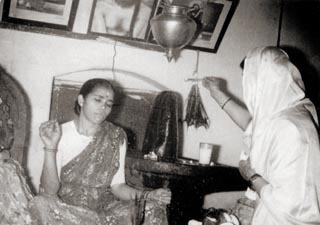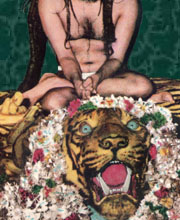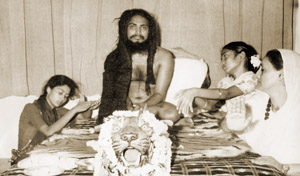Discerning Bhava
 G. Jagadish Kumar lived
and worked at the Bangalore ashram. Swamiji used to call him Gundu (baldy), maybe
to distinguish him from
D. Jagadish Kumar who also lived at the ashram. It was D. Jagadish who told this story which begins with Gundu
Jagadish making fun of people in trance.
G. Jagadish Kumar lived
and worked at the Bangalore ashram. Swamiji used to call him Gundu (baldy), maybe
to distinguish him from
D. Jagadish Kumar who also lived at the ashram. It was D. Jagadish who told this story which begins with Gundu
Jagadish making fun of people in trance.
Gundu Jagadish was a jokester and he was excellent at mimicking people. One time in Adivarapupeta, before the old ashram (and Samadhi) building was torn down, about a dozen devotees were sitting in the little portico just outside the Samadhi, sipping tea and chatting. Gundu Jagadish started hamming it up, mimicking any number of people known to his audience. He had people laughing so hard they were crying.
![]()
D. Jagadish’s story:
 There were times when Gundu Jagadish would make fun of the trance devotees when Swamiji was not at the ashram.
He would imitate them. He would dance like them. Those of us who were living at the ashram,
we would get together, probably after dinner
or something like that. So this fellow would imitate the trance devotees and make fun of them.
There were times when Gundu Jagadish would make fun of the trance devotees when Swamiji was not at the ashram.
He would imitate them. He would dance like them. Those of us who were living at the ashram,
we would get together, probably after dinner
or something like that. So this fellow would imitate the trance devotees and make fun of them.
A couple of examples come to mind. One lady would be dancing in trance, and once in a while she would look up at the clock to see what the time was. When she saw that it was about time for her to leave, she would just come out of the trance, pack and leave. So Gundu Jagadish would question, “How could trance be like that? How could she be looking at the clock all the time?” Basically he was trying to say that the lady devotee was not really in trance.
The other example he gave was some other lady devotee who would be in trance. She would go and pick the choicest fruit from Swamiji’s dais and bring it directly to her daughter, or to her son, or to her grandchildren, and not to any other devotee. Again, Gundu Jagadish would give that example to make fun of them.
One night when Swamiji was at the Bangalore ashram, both Yashoda and I were with him. Yashoda brought up the subject. Her intention was to let Swamiji know that people would make fun of trance because some trance devotees were behaving like that. Yashoda did not appreciate the behavior of those trance devotees and neither did I. She was trying to take that opportunity to present her opinion, ask Swamiji, and see what he would say. So she opened the subject, again in a very jocular manner, trying to convey her message to Swamiji.
Suddenly we found that Swamiji was very angry at us. He said, “Never again debate about trance.”
Swamiji gave us a very direct and strict warning that night. Never judge trance and never argue about trance. To this day I remember that.
![]()
 There were several occasions when Jagadish and Swamiji would talk about trance and false trance. Swamiji would name
names, but it was never important to him to try to stop anyone from acting. His attitude was that if people enjoyed acting, why the
need to stop them?
There were several occasions when Jagadish and Swamiji would talk about trance and false trance. Swamiji would name
names, but it was never important to him to try to stop anyone from acting. His attitude was that if people enjoyed acting, why the
need to stop them?
There was a woman who appeared to be in trance during the bhajans in Bangalore. She went up to Jagadish’s sister, Devi, and started pulling her by her hair. Swamiji was seated on the dais and when he saw what was going on he got up, he went over to the woman and started hitting and scolding her. “These are Swamiji's children. How dare you act this way towards his children!”
Swamiji scolded the woman before the others and said that she was in no trance. Over the next few days, the woman continued to go into trance, or so it seemed, so this raised a doubt with Jagadish and Devi. They asked Swamiji about it. He essentially implied that she was not in real trance. She was just acting. Swamiji made a point of telling Jagadish that he was not to believe anything that this woman said in bhava.
As long as the woman was not disturbing anyone, Swamiji just let her be.
![]()
Kodandam, one of the young men who accompanied Shivabalayogi during his first travels in India in the early 1960’s, saw a lot of trance but he still had serious doubts. He asked Swamiji about his doubts. Swamiji said, “There are certain true trances, but there are certain people who are not in trance.”
Kodanadam asked how to tell the difference. “You watch their behavior and from that you will come to know whether it is true or not.”
![]()

